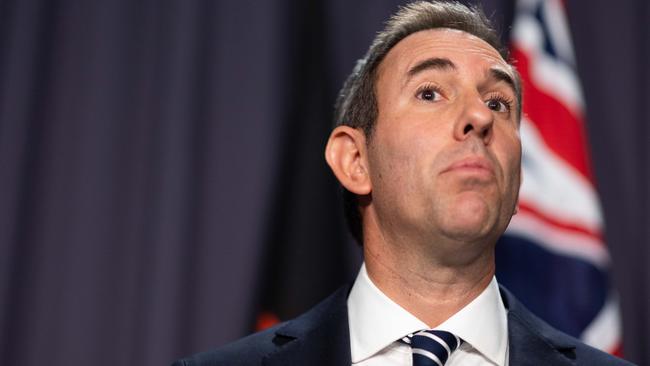Instead of ending ‘super wars’, Chalmers setting up coming battles
Far from ‘ending the super wars’, Jim Chalmers with his proposed objective for super all but guarantees it will not receive bipartisan support.

Far from “ending the super wars”, Jim Chalmers with his proposed objective for super has simply set the markers for coming battles between Labor, big super and the unions on one side, and the opposition and a handful of independent experts on the other.
Monday’s consultation paper will propose that “the objective of super is to preserve savings to deliver income for a dignified retirement, alongside government support, in an equitable and sustainable way”, and that this purpose be enshrined in law.
Legislating a purpose for super is a good idea in principle, and supported across the aisle.
Australian workers have $3.3 trillion in retirement savings and it would be good to safeguard this pool of savings from the hands of meddling politicians.
It would help those savings from being used for reasons other than funding retirements – such as, say, a deposit for a house, or for paying for another emergency “stimulus” measure the next time we have a crisis.
But there remains much to work out, as the Albanese government’s proposal includes some language that revisits political battles of the past decade and all but guarantees it will not receive bipartisan support in parliament.
Malcolm Turnbull tried and failed to enshrine in law David Murray’s simpler definition from 2014 that the goal was “to provide income in retirement to substitute or supplement the Age Pension”.
That was met with stiff opposition from Labor, who in June 2015 proposed the “superannuation system should ensure that as many Australians as possible have access to the resources for a dignified retirement without recourse to the full Age Pension”.
Nearly eight years later, Chalmers is back with a proposal that includes “dignified”, and opposition financial services spokesman Stuart Robert has already made it clear the Coalition still backs Murray’s original vision.
Where big super lands on the debate remains unclear – at least publicly – but their lobbying groups are mad keen on getting something akin to “comfortable” or “adequate” in the objective as a way to justify future increases in super contributions, and “dignified” might just do the trick as far as they are concerned.
The super giants are greedy for more and more of the nation’s savings pool – a commercial imperative to become bigger that is framed publicly as a way of lowering costs and offering better value for members.
Labor has a platform of pushing compulsory super all the way to 15 per cent – never mind that Treasury’s Retirement Income Review report of late 2020 said the super guarantee charge at 10.5 per cent (and on its way to 12 per cent by 2025) was already too high for many low and middle income earners.
And in a stretch, Chalmers says the proposed objective was still aligned with raiding workers’ savings to fund Labor’s nation-building projects – something only obliquely related to providing a “dignified” retirement.
If it doesn’t prevent that, you have to wonder whether future governments will find a way to justify doing just about anything with our super money – legislated objective, or not.








To join the conversation, please log in. Don't have an account? Register
Join the conversation, you are commenting as Logout